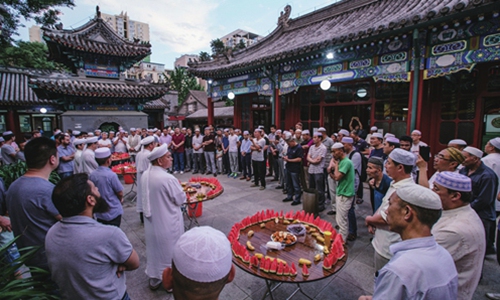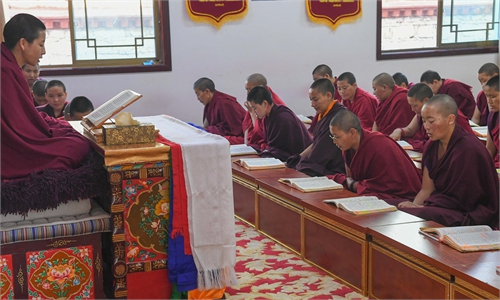Attempt to distort and slander mosque renovation truly ill-intentioned, malicious

Muslims pray in the Eid al-Fitr celebration at the Niujie Mosque in Beijing. Photo: Li Hao/GT
Recently, the renovation of the dome of the historic Najiaying Mosque in Tonghai County, Yuxi City, Southwest China's Yunnan Province, has been manipulated by certain forces and foreign media to attack China's religious policy. They deliberately and ill-intentionally view the localization of religion, especially the Chinese government's efforts to adapt religion to a socialist society, as "suppressing religious freedom."Given the sensitivity of religious affairs, the renovation of mosques in China can easily lead to misinterpretations. However, in reality, the Chinese-style mosque has always been the tradition of Chinese mosque architecture, and is deeply supported by Muslim communities.
For example, the oldest surviving mosque in China, the Huaisheng Mosque in Guangzhou, which was built during the Tang Dynasty (619-907), still retains its traditional Chinese style with blue bricks and gray tiles, flying eaves and upturned corners. Some other famous ancient mosques in China are also the same. To associate the renovation of the mosque's appearance with the destruction of religious freedom and the oppression of religious believers is truly malicious.
There has never been a fixed pattern for the form of religious architecture. The presence or absence of a dome has nothing to do with the authenticity of a mosque, nor does it have anything to do with religious beliefs. In fact, the renovation of the mosque to make it safer and improve its layout is to better serve the religious believers.
Those who use religious affairs to incite confrontation are essentially picking quarrels and provoking troubles. They need to understand that vandalism and disturbance are social security incidents and not religious behavior. These people should be dealt with according to the law, which is a just and necessary action to maintain the social stability that the Chinese people widely recognize. The identity of any religious believer is, first and foremost, a citizen of the country, and complying with national laws and policies is the responsibility and obligation of every citizen.
Additionally, during the process of religious development in China, some foreign forces want to infiltrate and create problems for China's governance. With ulterior motives, they, along with some foreign media, made an issue of the controversy caused by the renovation of the mosque, hyping up so-called disrespect for Islamic traditions. They emphasized the differences between China's governance policies toward Islam and those of other countries and then claimed that Chinese Muslims are being "suppressed."
Their purpose is to artificially create barriers between different groups in China, incite their confrontation and exclusion, and try to divide Chinese society. Their behaviors also aim to undermine the traditional friendship between China and Islamic countries and further isolate China in the international community. We must be vigilant about this.
The localization of religions is a universal phenomenon globally. It is a law that any religion must follow when it spreads and develops inside a country. In other words, if a religion wants to grow in a country or region, it must be coordinated and integrated with local culture, social customs, and habits.
In general, China encourages and guides the sinicization of religions in order to better adapt them to Chinese society so that religions can develop in a healthier way. This aligns with the historical traditions and basic framework of the development of religions in China. Many countries also understand China's policy of religious localization.
Respecting freedom of religion and belief while strengthening the management of religious affairs based on law are essential to state governance. This is generally conducive to the orderly functioning and harmony of all religious matters and the interests of religious believers.
As a multi-religious country, China has about 200 million religious believers. Such a situation would simply be impossible if the government repressed religion or if freedom of religion and belief in China were not guaranteed.
Over the years, China has adhered to the principle that religions in China must be Chinese in orientation and actively guided the adaptation of religions to a socialist society. It has united the religious believers and allowed us to pool strength to the greatest extent possible for our common goals. Such efforts have yielded positive results and received wide support.
This year marks the 70th anniversary of the establishment of the China Islamic Association. During the celebration of this event in Beijing on May 19, representatives of the Muslim community in China who attended the meeting generally applauded the principle of developing religions in the Chinese context, pledging to unite under and follow the leadership of the Communist Party of China and breathe the same air and share the same future with the country. This is a vivid example of the successful implementation of sinicization of religions in China.
The author is a reporter with the Global Times. opinion@globaltimes.com.cn

